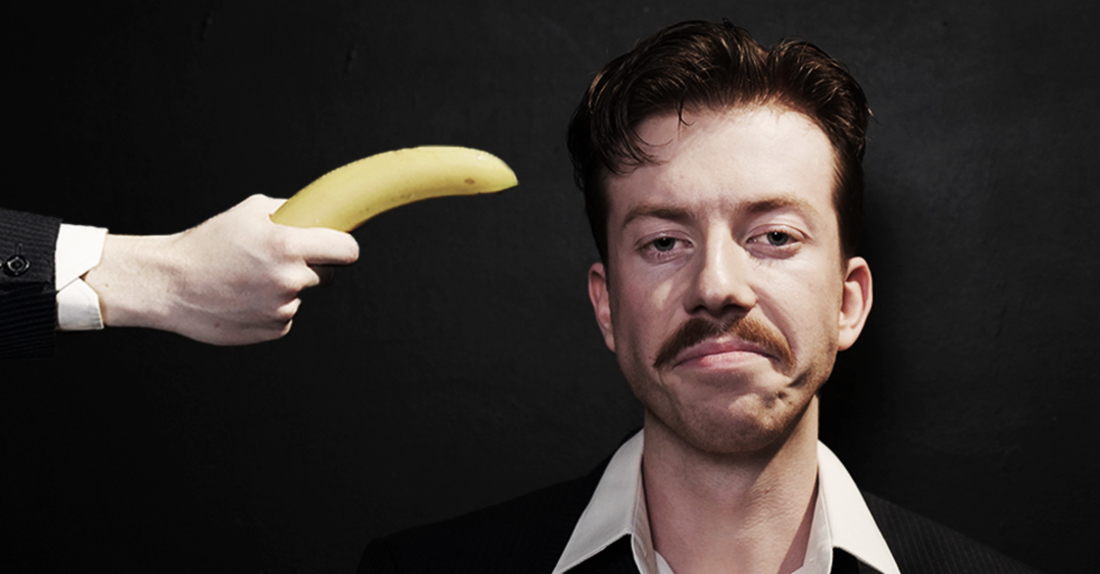Jack McGee
Ted Talks Crimes follows the journey of notorious gangster Ted the Tickler, as he attempts to redeem himself after having an altercation with an elderly woman prompts him to reconsider his life choices. The world of the play is comedically innocent. Reminiscent of Bugsy Malone, characters drink milk instead of booze, and instead of shooting people or breaking kneecaps, Ted tickles them. Jeremy mostly focuses on Ted, but frequently switches over to playing other characters, all exaggerated and cartoonish in their physicality and cadence.
This innocence, and its associated goofiness, I think is largely responsible for allowing me to emotionally connect to Ted. The lack of extreme violence, breaks down my normal, admittedly slightly pathetic, emotional wall, and lets me go man, I hope this guy gets his shit together. Maybe I’m just a baby, but the lack of broken kneecaps really makes a difference.
Though honestly, it might all come down to Hunt's performance. With the exception of a few gags that crossed the line for me into feeling cheap and winky (a memed-to-death monologue from Taken being a notable example), Hunt approaches this character with spectacular conviction and care. We watch him feel and process the events of the play with real weight. If you took this performance and dropped into a play that is more ostensibly dramatic, with less bananas, Looney Tunes sound effects, and pants-shitting, I genuinely think the audience would’ve been in tears. Which isn’t to say that the play would be better as a straight drama, far from it. As mentioned earlier, the lightness of touch makes it approachable, and also allows Hunt the opportunity to show off his impressive physicality and movement. He jumps, pivots, and throws himself around the stage, with the kind of deliberateness and control that makes it look effortless. Also, his elevated new-york-mobster accent never breaks, and is never grating. If nothing else, this verbal tightrope walk is a feat to behold.
This all being said, I feel there are times where the gags detract from the effectiveness of the show. The aforementioned pants-shitting, while sold by Hunt’s commitment to clutching his rear, felt like a funny but unneeded diversion. Equally, there’s a couple too many side characters, a few one-liners that don’t quite land, and some laughs that aren’t worth going for. I think the core of this show is strong enough, that it’s actually okay for it to try less to be funny. There’s nothing it needs to distract the audience from.
These strong foundations appear to be rooted in the show's script. Hunt clearly has an understanding of traditional structure, inserting a robust, yet idiosyncratic version of the hero’s journey into Ted’s story. The complexities of Ted’s relationship with redemption, his ideal self, and masculinity, play out largely via subtext. This journey is ultimately fulfilled in a stunningly beautiful scene near the end of the play, involving a gorilla. Elegantly lit by Kate Anderson, gently scored by Ben Kelly, and heartbreakingly performed by Hunt, it was a thrilling emotional conclusion to the play that if I’m honest, left me underwhelmed by the fifteen minutes of narrative wrapping up that followed it.
I’m comfortable assuming that Hunt’s performance succeeds as well as it does only through being effectively weaponized by the show's director, Emma Katene. She blocks the show well, making movement across the stage feel both natural and meaningful, and scatters in a handful of bold and creative staging decisions that keep it from ever feeling too predictable.
I have mixed feelings on the show's set (designed by Katene and Anderson) however. Tetris-esque wooden panels dots the walls, giving the sensation of the hard-American-mobster-world of the show, bleeding through. I really loved these panels, and found their minimalism effective, and absorbing. I was frustrated to not see them carry over the floor, which is barren, and felt like a constant reminder I was watching a show, a distraction from the world of the play. Equally, there are a couple of set pieces used for one off gags that cheapened the show for me. I was effectively immersed, and really didn’t need a slatted window for Ted to look through once, or a spray-painted-cardboard brick wall for him to discover.
These feelings carry over to the show's marketing (Tyler Clarke and Jeremy Hunt). I found the hero image/poster (photographed by Maeve O’Connell) particularly striking and effective, while honestly being a little put off by the photoshops of Ted into different gangster movie posters. As a whole, I was impressed how this show avoided easy parody of the genre, most of its references leaning on the conceptual side (IE, Ted having a Sicillian backstory, much like The Godfather Part Two) and therefore not being obnoxious, or distracting. I think this show is strong enough that it doesn’t need to make easy comparisons to these other texts. It stands on its own.
While I feel that the show could comfortably lose ten minutes and come out all the stronger for it, I’m still wowed by Ted Talks Crimes. It doesn’t reinvent the wheel, and its insights are ones you will have seen in other media, but they’re delivered well enough that it doesn’t matter. The vulnerability Hunt brings to a story about banana-murder is frankly inspiring, and I commend everyone who helped him bring this show to life.
Disclaimer
This is a small scene, theatre is incestuous, I have varying levels of professional and personal relationships with a lot of this team including Ben Kelly, Tyler Clarke, Lydia Joyce, Daniel Nodder, and Kate Anderson. I’ve done my best to be as honest about my thoughts as possible, but bias exists, and will be present here somewhere. Take my thoughts with that specific grain of salt.






